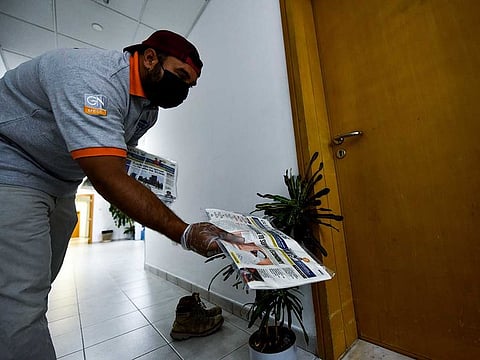COVID-19 returns traditional media to centre stage
People are shunning social media as they search for credible information on coronavirus

The new coronavirus has devastated all walks of life, but the pandemic has rejuvenated the media around the world. People’s perception of the media has changed with the arrival of the virus. That’s a huge positive for the industry.
The media’s approach was considered traditional and conservative, but the coronavirus changed all that. The prestige, power and importance of newspapers, radios and television channels, which were believed to be on the throes of death, have been restored.
As the coronavirus swept across the world, the print, audio and visual media have become the first and main source of reliable news. Everything else is viewed as fabricated news and rumours that spread fear, suspicion and confusion, and stir up ethnic strife in the society.
Journalists from newspapers, radio stations and TV channels are on the frontlines, rushing to hospitals, medical centres, quarantine places and airports to gather information. And they help provide the public with the latest updates and news about the deadly virus.
Coronavirus is terrible for the world, but it’s been a blessing in disguise to the media. It may have changed the media landscape for a long time.
Meanwhile "influencers” are falling sick; the goose that lays golden eggs is at risk of dying if the pandemic lasts longer. Because shops and salons are closed, the brands they used to promote are not being sold. Only pharmacies and food outlets, which don’t need publicity, remain open.
TV channels, which the “influencers” have said are on their way to warehouses and museums, have now regained visibility. They have become more relevant than ever.
Newspapers, which most optimistic experts said were going to be extinct in the next few years, have taken centre stage thanks to the credible information and analysis of the situation.
Radio, which almost fell into oblivion, returned to receive calls from their fans, seeking reliable information. At the same time, false rumours were spreading like wildfire on social media, undermining people’s confidence in the measures taken by local authorities to curb the disease and reduce its spread.
Before the age of corona, social media influencers believed they held sway over what they called the “traditional media”. However, the pandemic has changed that equation completely and dashed their hopes.
With the pandemic going global, the so-called traditional media quickly regained its power, becoming the most trusted source of news, and all of a sudden influencers turned into just followers of these media. Influencers lost the trust of their fans when they started republishing what they read on their social media channels.
People now have become more interested in the news and information published by official sources and the respected media that professionally, ethically and transparently report the news.
There are still some influencers who remain committed to ethics and principles expected by social media users.
The arrival of coronavirus has changed many prevailing perceptions. It is as if it was sent to tell us we were moving in the wrong direction. This applies to our economic policies, development plans and approaches, as well as to our concepts and values that we believe in.
So it’s time for us to reconsider our priorities and plans.
Media outlets can take heart from their fact they have regained impetus, and people have become more drawn to it than ever before. Coronavirus is terrible for the world, but it’s been a blessing in disguise to the media. It may have changed the media landscape for a long time.
— Ali Obaid Al Hameli, an Emirati writer and journalist, is director of news at Dubai Media Corporation.






